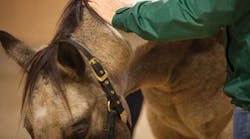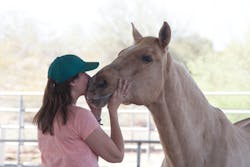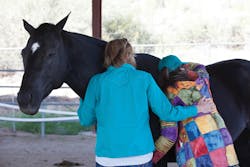Stress in the dental profession and why a horse could save your life
Like many dentists, I suffered from severe burnout and exhaustion, which affected my relationships, mood, and physical health. And, like many dentists, I have lost colleagues—some who were dear friends—to heart attacks and even suicide. Choosing to leave the profession in order to support those who remain was a matter of survival: mine and others'.
Stress levels in the dental profession are at an all-time high, while job satisfaction is on the decline.1
Dental professionals perceive dentistry to be more stressful than other occupations.2 This is consistent with their experiences of moderate to severe stress at work, where they endure an average of five to seven significant stress triggers each day.3 The most common contributing factors are (1) time pressures, (2) patient demands, (3) uncooperative patients (pediatric, fearful, nervous, or militant), (4) high levels of concentration and focus, and (5) team issues.
Many dental professionals are affected so deeply that their stress levels negatively interfere with their usual daily activities and interpersonal relationships up to five days a month, and often lead to early retirement from the profession.3 Burnout, mood disorders (particularly depression and anxiety), alcohol abuse, and physical health issues such as cardiovascular problems can all be tied back to stress levels in dental practices.2,3
READ MORE | Blackberry to iPhone: How dentistry has changed in the last 10 years
When it comes down to it, reconciling the clinical, operational, entrepreneurial, and organizational aspects of a dental career can result in dangerously high stress levels. Many dental professionals, for many reasons, fail to practice adequate self care to mitigate this. The impact of this unrelenting personal and professional strain can be debilitating and, for some, ultimately fatal.
Like many dentists, I suffered from severe burnout and exhaustion, which affected my relationships, mood, and physical health. And, like many dentists, I have lost colleagues—some who were dear friends—to heart attacks and even suicide. Choosing to leave the profession in order to support those who remain was a matter of survival: mine and others'.
After personally experiencing the benefit of coaching, I felt I had found a path to restoring my spirit. After selling my practice, I undertook extensive training to gain certifications as a life coach and an Equine Gestalt Coach. It is a beautiful synchronicity: I have been able to translate my lifelong passion for horses into a platform for helping other dentists sustain themselves and their practices. The benefits of equine interactions are profound on all levels: physiological, psychological/emotional, and spiritual.
Did you know?
- The human heart's electromagnetic field extends up to eight to 10 feet from the body.
- A horse's heart projects an electromagnetic field five times larger than the human one.
- The horse's electromagnetic field can directly influence a person's heart rhythm, increasing coherence.
- A coherent heart pattern correlates with positive emotional states such as calm and joy.
- It is also a solid measure of well-being, indicating a system that can efficiently recover and adjust to stressful situations.4
Working with horses has been shown to impart many physiological and emotional benefits, including lowered blood pressure and heart rate, increased levels of beta-endorphins (i.e., neurotransmitters that serve as pain suppressors); decreased stress levels; reduced feelings of anger, hostility, tension and anxiety; improved social functioning; and increased feelings of empowerment, trust, patience, and self-efficacy.5 New research has also shown a correlation between depression, which is endemic in the dental profession, and cardiovascular disease, which is the number one killer of dentists,6 noting that prompt and effective treatment of depression can measurably reduce a patient's chance of having a stroke, heart failure, a heart attack, or even dying.7
I have found the Equine Gestalt Coaching Method (EGCM) to be a powerful approach to resolving stress and alleviating many contributing factors to depression in dental professionals. Working with two coaches, one equine and one human, participants benefit from the grounding physiological influence of being in a horse's energy field while they tackle long-standing issues relating to relationships, limiting belief systems, self-sabotaging behaviors, and more. The healing presence of the horse and their intuitive responses help people tap into their deepest truths through a supportive and nonjudgmental experience unlike any other—they learn to recognize and listen to the somatic wisdom of their own bodies, rewire previously unchallenged beliefs and behavioral patterns, and establish a more positive and aware framework for the future. As one of my workshop participants noted, "You don't quickly forget what a 1,200-pound animal teaches you!"
READ MORE | Down with stress! How to be happier in your dental practice
Equine Gestalt Coaching can benefit dental professionals at all stages in their careers. At one of my recent workshops, a new dentist was able to build her confidence while working with a horse to accept her as a leader. She felt the presence and support of the horse through an emotional journey and a catalyst in resolving previously unexplored insecurities. At the same workshop, a dentist approaching retirement was feeling drained and trapped by unresolved employee issues. Her catharsis, which she described as "like lancing an abscess to drain the poison," allowed her to see the bigger picture with a new awareness and clarity. This insight helped her reevaluate the situation and her game plan. A dental hygienist learned to listen to her intuition and to recognize behaviors that were stress inducing and unproductive in leading her team. A general consensus from EGCM workshop participants is that they leave with a greater self-awareness and emotional equilibrium, improved boundary setting, and increased ability to trust and care for themselves.
Private coaching sessions are powerful in and of themselves. However, an unexpected benefit of workshops is that participants are able to connect with other dental professionals on a very human level, alleviating emotional isolation that contributes to stress and depression and building a support system of colleagues experiencing similar issues. Intact team workshops can also significantly improve practice dynamics and effectiveness.
To learn more, listen to my conversation about stress and dentistry with Gary Takacs on his podcast, "The Thriving Dentist" here. You can also visit braveheartequinecoaching.com to schedule a complimentary 30-minute exploratory coaching session. For information on upcoming retreats, click here.
References
1. Evans S. Tackling stress and anxiety in the dental profession. Dentistry.co.uk website. http://www.dentistry.co.uk/2015/05/21/tackling-stress-anxiety-dental-profession/. Published May 21 2015. Accessed May 3, 2016.
2. Rada R, Johnson-Leong C. Stress, Burnout, Anxiety and Depression in Dentists. J Am Dent Assoc. 2004; 135. http://www.saudident.com/album/data/media/17/stress_burnout_anxiety_and_depressiona_among_dentists.pdf
3. Butler, J. In Your Face: Facing the Realities of Stress in Dentistry. Dentaltown website. http://www.dentaltown.com/Dentaltown/Article.aspx?i=340&aid=4652. Published November 2013. Accessed May 3, 2016.
4. Mistral K. Measuring the Emotional Bond between Horses and Humans. Horse Connection website. http://horseconnection.com/heart-to-heart-a-quantitative-approach-to-measuring-the-emotional-bond-between-horses-and-humans-august-2007/. Published August 2007. Accessed May 3, 2016.
5. Baldwin A, McCraty R. Heart-to-Heart Communication With Horses. Heartmath Institute website. https://www.heartmath.org/resources/downloads/heart-heart-communication-horses/. Accessed May 3, 2016.
6. Lang R. Stress in Dentistry-It Could Kill You! Oral Health Group website. http://www.oralhealthgroup.com/features/stress-in-dentistry-it-could-kill-you/. Published September 1, 2007. Accessed May 3, 2016.
7. Improving Symptoms of Depression Can Reduce Risk of Major Cardiovascular Problems. Newswise website. http://www.newswise.com/articles/improving-symptoms-of-depression-can-reduce-risk-of-major-cardiovascular-problems-new-study-finds. Published March 29, 2016. Accessed May 3, 2016.
Bethany Piziks, DDS, is deeply committed to inspiring dentists who long to achieve balance, peace, and prosperity within the chaos a dental practice. Visit braveheartequinecoaching.com to learn how Dr. Bethany Piziks and her equine partners can help you restore your spirit, or call (231) 633-7373.







